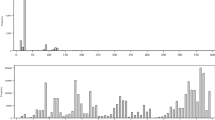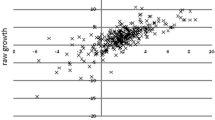Abstract
This article updates through the 1992 election the equation originally presented in Fair (1978) explaining votes for president. Conditional predictions of the 1996 election are also made.
Similar content being viewed by others
References
Abramowitz, Alan I. (1988). An improved model for predicting presidential election outcomes.Political Science and Politics 21: 843–847.
Balke, Nathan S., and Gordon, Robert J. (1986). Appendix B historical data, in Robert J. Gordon (ed.),The American Business Cycle: Continuity and Change. Chicago: University of Chicago Press.
Burner, David (1971). Election of 1924, in Arthur M. Schlesinger, Jr. (ed.),History of American Presidential Elections 1789–1968, Volume III. New York: McGraw-Hill Book Co.
Campbell, James E., and Wink, Kenneth A. (1990). Trial-heat forecasts of the presidential vote.American Politics Quarterly 18: 251–269.
Chow, Gregory C., and Lin, An-loh (1971). Best linear unbiased interpolation distribution and extrapolation of time series by related series.Review of Economics and Statistics 53: 372–376.
Erikson, Robert S. (1989). Economic conditions and the presidential vote.American Political Science Review 83: 567–573.
Fackler, Tim, and Lin, Tse-min (1994). Political corruption and presidential elections. Presented at the 1994 meetings of the Midwest Political Science Association, Chicago, Illinois, April 14–16.
Fair, Ray C. (1978). The effect of economic events on votes for president.Review of Economics and Statistics 60: 159–173.
Fair, Ray C. (1982) The effect of economic events on votes for president: 1980 results.Review of Economics and Statistics 64: 322–325.
Fair, Ray C. (1988). The effect of economic events on votes for president: 1984 update.Political Behavior 10: 168–177.
Fair, Ray C. (1990). The effect of economic events on votes for president: 1988 update, mimeo.
Fair, Ray C. (1994).Testing Macroeconometric Models. Cambridge, MA: Harvard University Press.
Gleisner, Richard F. (1992). Economic determinants of presidential elections: The Fair Model.Political Behavior 14: 383–394.
Haynes, Stephen E., and Stone, Joe A. (1994). Why did economic models falsely predict a Bush lanslide in 1992?Contemporary Economic Policy 12: 123–130.
Hibbs, Douglas A., Jr. (1987).The American Political Economy. Cambridge, MA: Harvard University Press.
Ladd, Everett Carll (1993). The 1992 vote for President Clinton: Another brittle mandate?Political Science Quarterly 108: 1–28.
Lebergott, Stanley (1964).Manpower in Economic Growth: The American Record Since 1800. New York: McGraw-Hill Book Co.
Lewis-Beck, Michael S., and Rice, Tom W. (1992).Forecasting Elections. Washington, DC: CQ Press.
Lynch, G. Patrick (1993). Economic conditions and presidential elections from 1880 to 1980. Presented at the 1993 Southern Political Science Association Annual Meeting, Savannah, Georgia, November 5–7.
Lynch, G. Patrick, and Munger, Michael (1994). Economic fluctuations and presidential elections from 1872 to 1988: Were voters retrospective? Presented at the 1994 meetings of the Midwest Political Science Association, Chicago, Illinois, April 14–16.
Triplett, Jack E. (1992). Economic theory and BEA's alternative quantity and price indexes.Survey of Current Business 72: 49–52.
U. S. Department of Commerce, Bureau of the Census (1975).Historical Statistics of the United States, Colonial Times to 1970. Washington, DC: U.S. Government Printing Office.
U.S. Department of Commerce, Bureau of the Census (1988).Statistical Abstract of the United States (108th ed.). Washington, DC: U.S. Government Printing Office.
U.S. Department of Commerce, Bureau of the Census (1993).Statistical Abstract of the United States (113th ed.). Washington, DC: U.S. Government Printing Office.
U.S. Department of Commerce, Bureau of Economic Analysis (1973).Long Term Economic Growth 1860–1970, Washington, DC: U.S. Government Printing Office.
U.S. Department of Commerce, Bureau of Economic Analysis (1981).The National Income and Product Accounts of the United States, 1929–1976 Statistical Tables. Washington, DC: U.S. Government Printing Office.
U.S. Department of Commerce, Bureau of Economic Analysis (1992).National Income and Product Accounts of the United States, Volume 2, 1959–88. Washington, DC: U.S. Government Printing Office.
U.S. Department of Commerce, Bureau of Economic Analysis (1993).The National Income and Product Accounts of the United States, Volume 1, 1929–58. Washington, DC: U.S. Government Printing Office.
Young, Allan H. (1992). Alternative measures of change in real output and prices.Survey of Current Business 72: 32–48.
Author information
Authors and Affiliations
Corresponding author
Rights and permissions
About this article
Cite this article
Fair, R.C. The effect of economic events on votes for president: 1992 update. Polit Behav 18, 119–139 (1996). https://doi.org/10.1007/BF01498787
Issue Date:
DOI: https://doi.org/10.1007/BF01498787




